Sections in this page
Loading...
Letters of Introduction
From the Presiding Member
I am pleased to present the 2023-24 Annual Report.
The findings from the Royal Commission into Early Childhood Education and Care emphasised the importance of a high performing regulator; implementing the report's recommendations has been central to the agency's work since its release in August 2023.
The Board endorsed a 2024 Schools Regulatory Strategy focusing on schools whose five-year registration review was due. This allowed resources to be reallocated to the Early Childhood Services team to support the important work of implementing the Royal Commission recommendations.
The strategy also created an opportunity to evaluate the operations of the schools regulatory approach. To this end, the Board established an advisory committee, the Schools Regulatory Committee, to oversee and provide direction on the review of the schools regulatory function and regulatory framework including online and distance education.
The end of the 2023-24 financial year has coincided with the end of the Board's Strategic Plan for 2022-24. One of the strategic deliverables was to strengthen the Board's governance and audit arrangements. This was achieved through engagement of an internal audit partner and approval of an Internal Audit Plan for 2024-25.
I would like to take the opportunity to thank outgoing Board members, Anna Standish, Christopher Prance, Elizabeth Worrell, Sue Kennedy-Branford and Deputy Presiding Member Greg Hayes for the support, commitment and expertise they brought to the Board.
It is my pleasure to welcome our new Board members Anne Dunstan, Elysia Ryan, Jie Zhu and Helen Gibbons.
This annual report summarises the agency's achievements and continuous improvement. The Board and I look forward to working alongside the agency's Chief Executive, Kerry Leaver, in supporting our vision that all children and young people have access to high-quality education and care in safe, well-governed and well-managed services.
Alana Girvin
Presiding Member
From the Chief Executive
The past year has been one of reform, to strengthen our capacity and effectiveness as a regulator and to implement the recommendations of the Royal Commission into Early Childhood Education and Care.
Underpinned by our unwavering commitment to the safety and wellbeing of all children and young people, the Commission's recommendations have been our highest priority.
To ensure the agency was in the best position to address the recommendations, the organisation was restructured to implement a Regulatory Reform team, responsible for driving the agency's reform initiatives. An Intake and Assessment team was also implemented to provide a central point for incoming communications, processing notifications and conducting initial assessments of applications and complaints. This change aims to position the Education Standards Board as the first point of contact for services.
Our reform work is supported by an increased funding allocation and a ministerially-appointed independent Change Management Panel.
In line with our regulatory posture, released in 2023, we have invested in providing educational resources and workshops to increase voluntary compliance across the sector. We have also increased our engagement through implementation of the Regulatory Roundtable forum as part of a broader Provider Engagement Model, to foster a more collaborative regulatory environment that supports the achievement of our regulatory outcomes.
I am honoured as Chief Executive of the Board to continue this important work alongside the Board and employees to ensure the safety, health and wellbeing of children.
Kerry Leaver
Chief Executive and Registrar
Overview: About the Education Standards Board
The Education and Early Childhood Services (Registration and Standards) Board, known as the Education Standards Board (the Board), was established in 2012 under the Education and Early Childhood Services (Registration and Standards) Act 2011 (State Act). The employees of the Board are commonly referred to as the ESB.
The Board is an independent statutory authority responsible for the registration and regulation of early childhood services, and registration of schools for domestic and overseas students. The Board is responsible to the Minister for Education, Training and Skills, to ensure efficient and effective performance of its registration and regulatory responsibility, compliance with its legislative objectives, sound management of the organisation, and attainment of performance objectives.
The Board's functions are set out under section 29 of the State Act and, as the state regulatory authority for early childhood education and care, the Board has specific functions under section 260 of the Education and Care Services National Law (South Australia) (National Law SA) which is adopted under the State Act.
The Board delegates regulatory powers and functions, human resources and financial management to the Chief Executive and Registrar, with further delegations to employees of the Board.
Why we regulate
Access to high quality education and care services can contribute to better social, educational and employment outcomes across a child's lifespan.
The Board's priority is to minimise any risks to the safety, health and wellbeing of children. We respond with regulatory action that is proportionate to the risks and harms being addressed.
We regulate the provision of education and early childhood services in a manner that maintains high standards of competence and conduct by providers to:
- recognise that all children should have access to high quality education and early childhood facilities and services
- provide for a diverse range of services
- recognise the rights of parents to access a diverse range of service providers
- enhance public confidence in the operation of education and early childhood services.
Our regulatory framework
The Board operates under three distinct regulatory frameworks:

Early childhood education and care
We regulate early childhood education and care services under the National Quality Framework (NQF), including long day care, family day care, preschools and outside school hours care (OSHC).
The NQF includes:
- Education and Care Services National Law 2010 (National Law)
- Education and Care Services National Regulations 2011
- National Quality Standard (NQS)
- The assessment and rating process
- Approved learning frameworks.
Our regulatory activities under the NQF include assessing provider and service applications, waiver applications, assessment and rating against the NQS and proactive monitoring regulated parties' compliance with the NQF.
We respond to notifications and complaints received under the NQF, by undertaking investigations and recommending statutory and administrative compliance action, consistent with our Compliance and Enforcement policy.
The agency also provides practical and constructive information and advice on how regulated parties can achieve and maintain voluntary compliance under their regulatory obligations and manage existing and emerging regulatory risk.
Early childhood services that do not fall within the scope of the NQF are known as residual services and are also subject to regulation under Schedule 2 of the State Act. These include in-home care, mobile care and occasional services.
Residual services are regulated through a modified use of the National Law and through service-specific regulations and standards.
Schools
We regulate all government and on-government schools providing primary and secondary education, including state government, Catholic and independent schools.
Our regulatory activities for schools include determining provider applications, maintaining the schools register under the State Act and reviewing registration against the Standards for Registration and Review of Registration of Schools in South Australia.
International education
We endorse schools to provide education services to overseas students for registration on the Commonwealth Register of Institutions and Courses for Overseas Students (CRICOS) and register and monitor organisations that operate student exchange programs.
Our strategic focus
Our vision
To make a positive difference to the lives of South Australian children and young people by ensuring they have access to high quality education and early childhood services.
Our values
We uphold the public sector values through our decisions, actions and interactions. In addition, we are committed to the public sector values chosen by our staff that reflect our context:
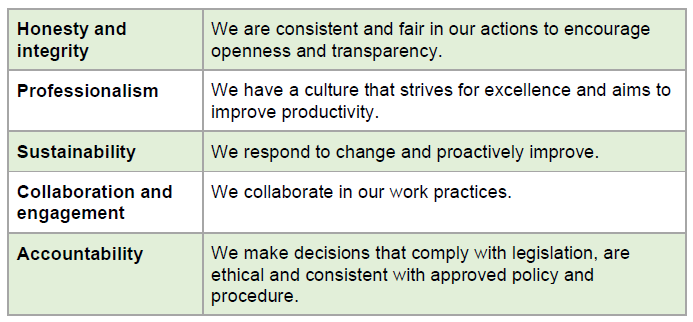
Our organisational structure
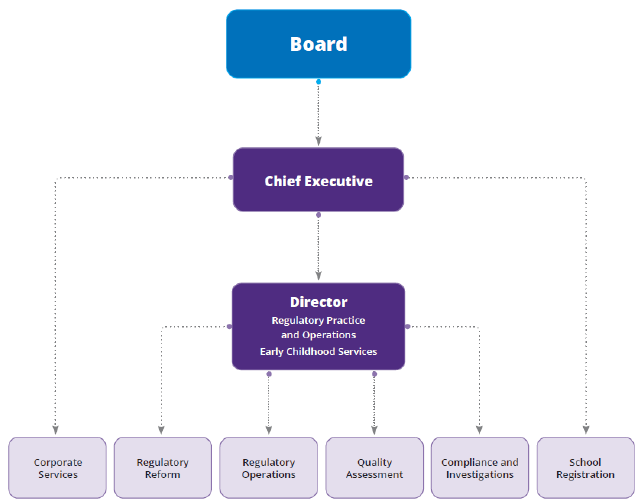
Our board members
The Board comprises 13 members appointed by the Governer in Executive Council on the nomination of the Minister for Education, Training and Skills. Of those members:
- one (who will be the presiding member) must be a person who has, in the opinion of the Minister, extensive knowledge and expertise in the education and care of children
- two must be from the Department for Education
- two must be from the Association of Independent Schools of South Australia (AISSA)
- two must be from the South Australian Commission for Catholic Schools Incorporated
- two must be from a prescribed childcare body; and
- one must be a legal practitioner.
Expressions of interest are called for the remaining member positions.
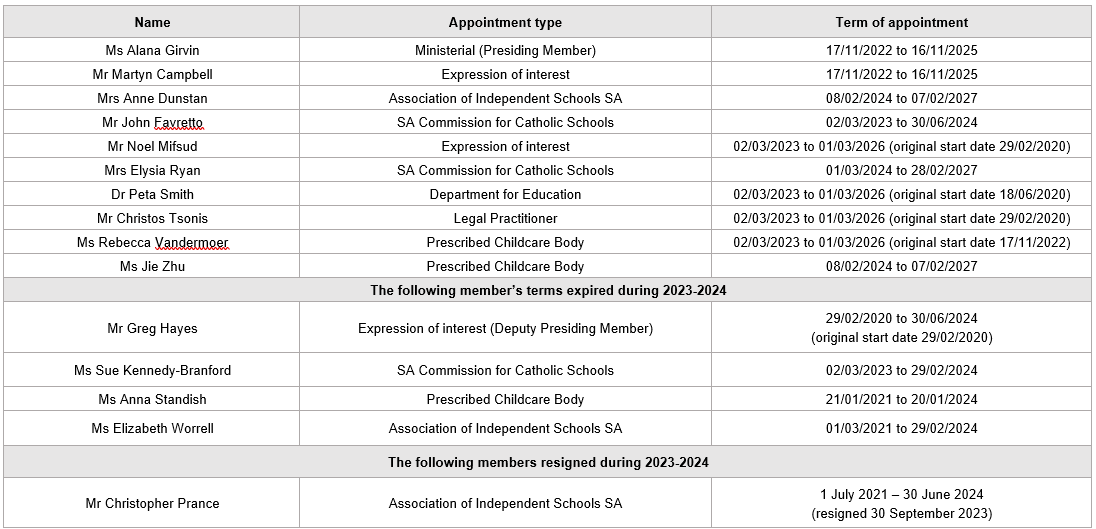
Our Executive
Kerry Leaver
Chief Executive and Registrar
Kerry is the Early Childhood Services Registrar, Government Schools Registrar, Non-Government Schools Registrar and Chief Executive, responsible for carrying out the functions of the Registrar roles and the Chief Executive as determined by the Board.
Sean Heffernan
Director, Regulatory Practice and Operations (Early Childhood Services)
Sean leads the Early Childhood Services group, including Quality Assessment, Compliance and Investigations, Regulatory Operations and Regulatory Reform.
Changes to the agency
The Royal Commission into Early Childhood Education and Care provided the agency with an opportunity to reflect on practices and make improvements.
The Royal Commission found that the agency is struggling to perform its legislated functions, and made a corresponding recommendation, 'Improving the functioning of the ESB' (recommendation 7).
In 2023-24, we undertook an organisational restructure to support implementation of the recommendation including:
- creation of a Regulatory Reform team to support the delivery of the reform program
- creation of a Regulatory Operations function, that included an Intake and Assessment team, to position the ESB as the first point of contact for services with quality or regulatory questions, as well as growing data analytics and education and guidance functions
- restructuring the former Quality Assurance function to the Quality Assessment function, with Regulatory Officers performing assessment and ratings and assessing applications under the National Law, to ensure the ESB clears the backlog of services that have not been assessed and rated in the last three years.
Our Minister
The Honourable Blair Boyer MP is the Minister for Education, Training and Skills.
Other related agencies (within the Minister's areas of responsibility)
- Department for Education
- Officer for Early Childhood Development
- TAFE SA
- South Australian Certificate of Education Board of South Australia
- Teacher's Registration Board of South Australia
- Child Development Council
- South Australian Skills Commission.
The agency's performance
Performance at a glance
In 2023-24, the agency regulated with a risk-based and proportionate approach that aligns with our strategic priorities for 2022-24 through the following actions:
- Performed 519 service visits within the early childhood sector to administer our legislative obligations.
- Undertook 602 reviews of school registration, as required by the Act.
- Released a School Complaints Management Policy to better articulate how the agency assesses and manages school complaints in line with the Act.
- Increased the percentage of services rated under the 2018 National Quality Standards from 45% to 53%.
- Responded to the Royal Commission into Early Childhood Education and Care, with further detail provided below.
- Established a Regulatory Roundtable as part of a broader Provider Engagement Model, to foster a more collaborative regulatory environment.
Community Child Care Fund Restricted Services Project
There are nine community childcare services in South Australia currently funded by the Commonwealth Government under the Community Child Care Fund Restricted Grants (CCCFR), a non-competitive grant program. These services are out of scope within the Education and Care Services National Law (South Australia) (National Law SA) and the NQF and therefore are not regulated by the Board.
The agency has reviewed all nine CCCFR services against the NQF and analysis of service strengths and weaknesses will inform the transition to practical and culturally sensitive quality standards under State Regulations.
Royal Commission into Early Childhood Education and Care - activities and achievements
Two of the Royal Commission into Early childhood Education and Care's 43 recommendations focused on the agency.
- Recommendation 7 was to improve the functioning of the agency so that every early childhood education and care provider is assessed and rated at least every three years. It recommended the State Government appoint an independent change management panel to support this as part of a reform agenda.
- Recommendation 30 was a focus on improving services that are "Working Towards" the National Quality Standard.
The agency has focused its efforts on implementing the Royal Commission's recommendation 7 through:
- establishing a Change Management Panel to work alongside the Board and the Chief Executive to drive regulatory reform. The Panel undertakes work on behalf of the agency and performs an advisory and oversight role.
- establishing a Reform Roadmap to articulate our approach and prioritise our work.
- designing and implementing a regulatory capability framework.
- designing and implementing a Regulatory Officer induction program to ensure all Regulatory Officers are equipped with the right skills and that new officers receive sufficient induction, shadowing and mentoring.
- recruiting Regulatory Officers, with the goal of increasing from nine to 26 officers.
- creating an intake and assessment team to deliver high quality, structured and more timely outcomes for enquiries, notifications, applications and complaints lodged with the agency.
- providing more relevant, high value educational activities that support regulated parties to increase and maintain voluntary compliance.
Contribution to whole of government objectives
The agency contributes to South Australian Government initiatives to ensure universal access to quality preschool for families with three and four-year old children and accessible education for children of school age by:
- monitoring early childhood services through quality assessment and compliance monitoring within the NWF to promote consistency in services across South Australia
- monitoring schools against the standards of registration to provide accessible, quality education from reception to year 12.
Agency specific objectives and performance
Our agency objectives are to:
- regulate schools, student exchange organisations, and early childhood education and care services with a risk and standards-based approach
- positively engage with stakeholders
- support our people and improve our business.
Performance against these objectives as at 30 June 2024 is summarised below.
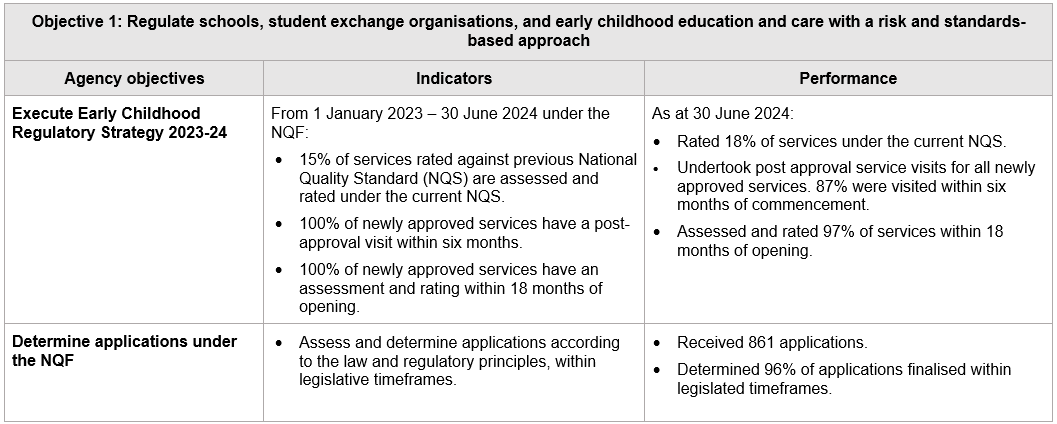
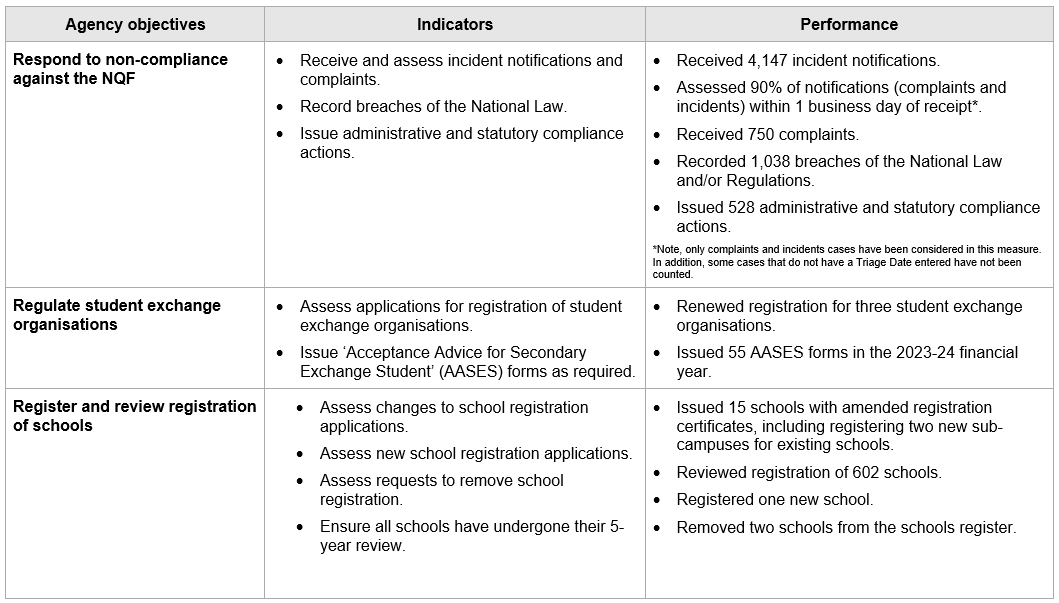
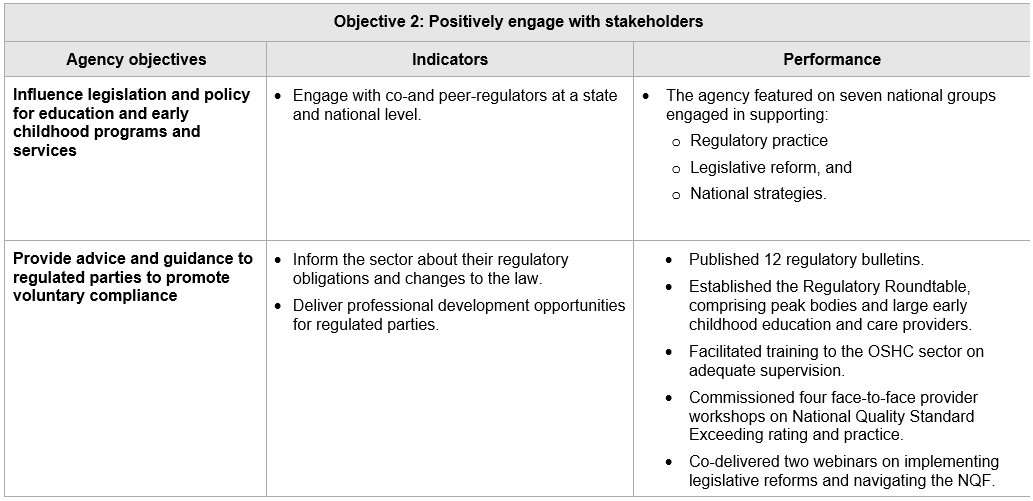
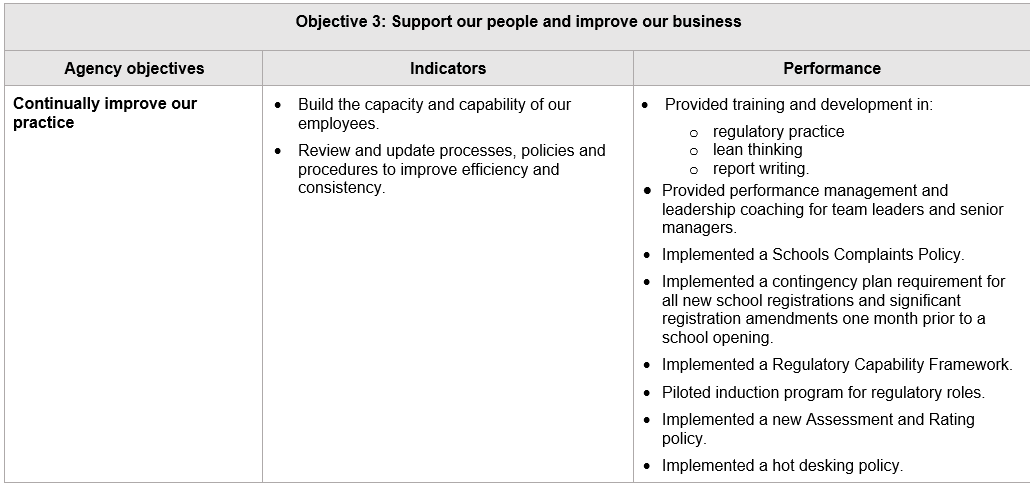

Employment opportunity programs
Nil.
Performance management and professional development
Employee performance is managed according to our Performance Management Framework which was revised and released in June 2023.
The framework ensures that employees complete individual work plans stemming from structured one-on-one performance management meetings.
Ninety percent of employees completed a mid-year and end of year performance review with their line manager. The remaining ten percent represents four employees who took extended leave periods prior to June 30.
Work health, safety and return to work programs
Employee health and wellbeing
Our Employee Assistance Program offers employees three confidential professional and personal counselling sessions for themselves or an immediate family member, at no cost.
The agency also provides services such as influenza vaccination and internal communication about health and wellbeing topics.
Four staff trained as Mental Health First Aid Officers and a Health and Wellbeing Policy is being finalised.
The ESB Executive participated in the launch event of the Autism Inclusion Charter and received training that aligns with the Charter's principles.
Work health and safety management
The work health and safety committee is the principle means by which the agency consults and works collaboratively with employees to ensure a safe and healthy working environment.
The committee has representation from all teams and meets quarterly.
Injury management
The agency has a service level agreement with the Department for Education for management of injury claims.
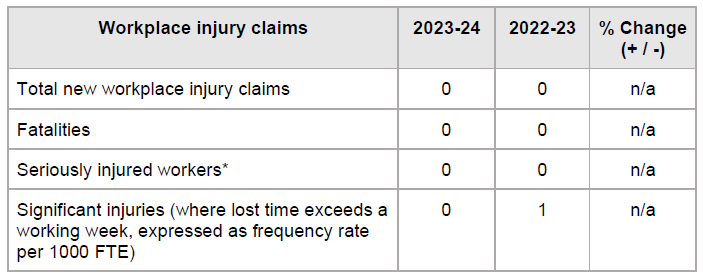
*number of claimants assessed during the reporting period as having a whole person impairment of 30% or more under the Return to Work Act 2014 (Part 2 Division 5).

**before third-party recovery.
Data for previous years is available at: Work health and safety and return to work performance of Education Standards Board - Dataset - data.sa.gov.au.
Executive employment in the agency

Data for previous years is available at: Executive employment in Education Standards Board - Dataset - data.sa.gov.au.
The Office of the Commissioner for Public Sector Employment has a workforce information page that provides further information on the breakdown of executive gender, salary and tenure by agency.
Financial performance
Financial performance at a glance
The following is a brief summary of the overall financial position of the agency. The information is unaudited. Full audited financial statements for 2023-24 are attached to this report.
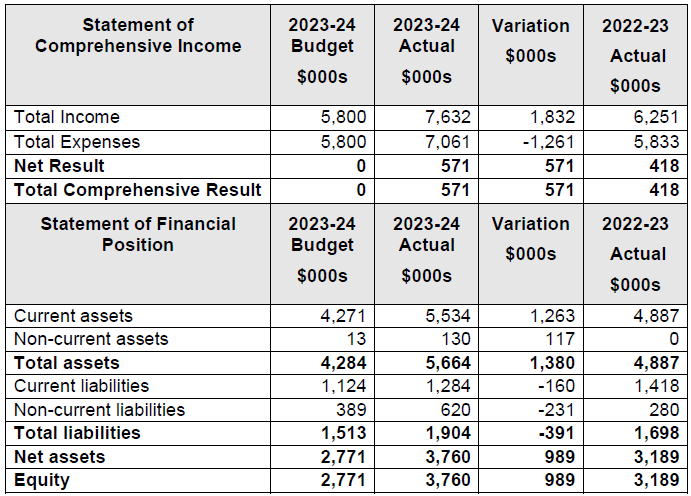
Consultants' disclosure
The following is a summary of external consultants that have been engaged by the agency, the nature of the work undertaken and the actual payments made for the work undertaken during the financial year.
Consultancies with a contract value below $10,000 each

Consultancies with a contract value above $10,000 each
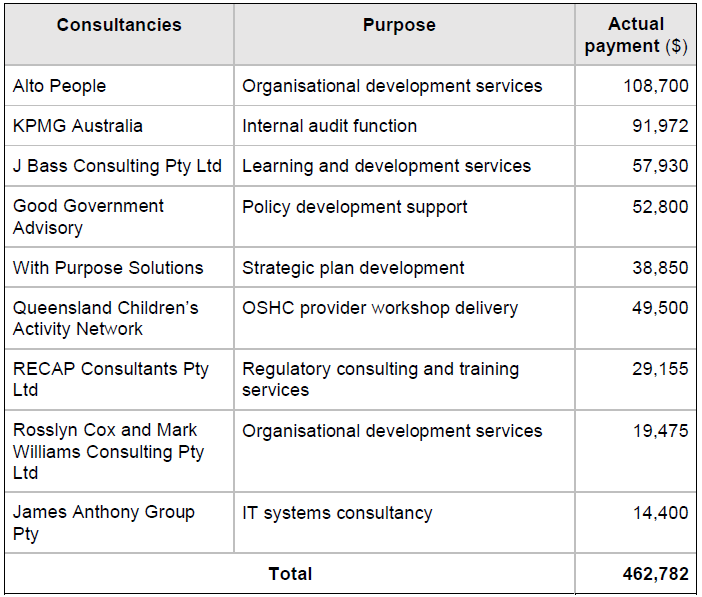
Data for previous years is available at: Consultants used by Education Standards Board - Dataset - data.sa.gov.au.
See also the Consolidated Financial Report of the Department of Treasury and Finance for total value of consultancy contracts across the South Australian Public Sector.
Contractors' disclosure
The following is a summary of external contractors that have been engaged by the agency, the nature of work undertaken, and the actual payments made for work undertaken during the financial year.
Contractors with a contract value below $10,000

Contractors with a contract value above $10,000 each
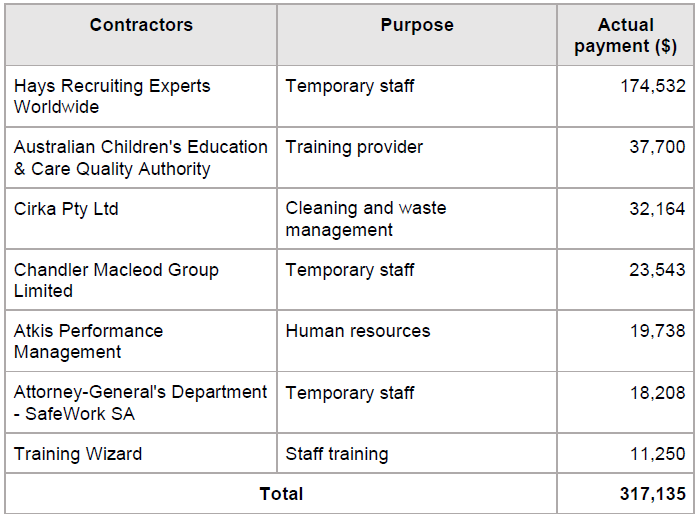
Data for previous years is available at: Contractors used by Education Standards Board - Dataset - data.sa.gov.au.
The details of South Australian Government-awarded contracts for goods, services, and works are displayed on the SA Tenders and Contracts website. View the agency list of contracts.
The website also provides details of across government contracts.
Risk management
Risk and audit at a glance
Risk is managed through an operation Risk Management Committee which includes the Executives and Manager, Corporate Services. The committee met four times during 2023-24. Committee members identify, treat and monitor intolerable risks and report to the Board.
An independent internal auditor was appointed for the first time during the financial year. This will provide assurance to the Board that the agency's powers and functions are carried out in compliance with the relevant regulations and policies.
During 2023-24, risk management activities also included:
- appointing a new external auditor
- working towards establishing a Board Audit and Risk Committee
- undertaking a comprehensive risk register review and risk management framework review
- undertaking a complaints management internal audit
- developing an internal audit plan for 2024-25.
Fraud detected in the agency
No instances of fraud detected.
Strategies implemented to control and prevent fraud
The Board follows whole of government policies for prevention and control of fraud. The Board has zero tolerance for dishonest and unethical behaviour and is committed to prevention, detection and control of fraud, corruption, maladministration and misconduct relating to its activities.
The Board's detection, control and prevention strategies include:
- appropriate segregation of duties
- delegations of authority
- public sector code of conduct training for all new employees, renewed every two years
- risk register that monitors internal fraud and corruption
- employee onboarding and offboarding procedures.
Serious or systemic offences against the Board and/or the South Australian public sector are referred to the Office for Public Integrity or inquiry agencies to investigate.
Data for previous years is available at: Fraud detected in Education Standards Board - Dataset - data.sa.gov.au.
Public interest disclosure
There were no Public Interest Disclosures during 2023-24 under the Public Interest Disclosure Act 2018.
Data for previous years is available at: Public interest (formerly whistle-blowers') disclosure of Education Standards Board - Dataset - data.sa.gov.au.
Note: Disclosure of public interest information was previously reported under the Whistleblowers Protection Act 1993 and repealed by the Public Interest Disclosure Act 2018 on 01/07/2019.
Reporting required under any other act or regulation
Nil.
Reporting required under the Carer's Recognition Act 2005
Nil.
Public complaints
Number of public complaints reported
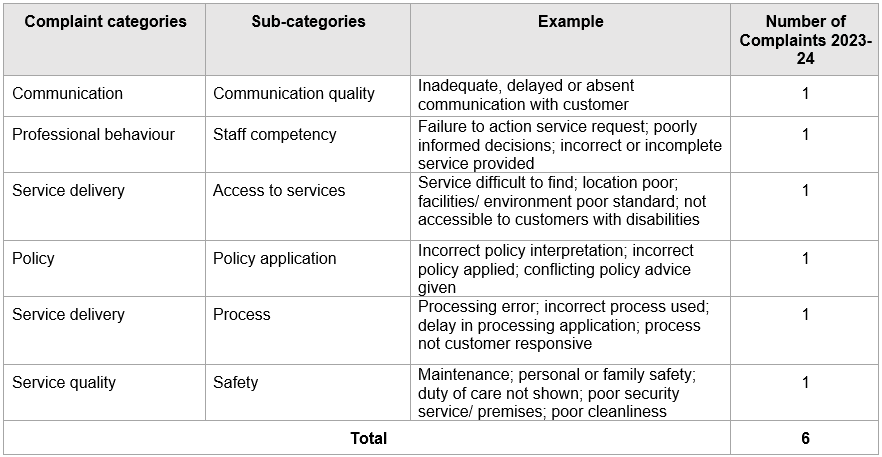

Data for previous years is available at: Reporting of public complaints for Education Standards Board - Dataset - data.sa.gov.au.
Service improvements
Our early childhood service applications process was revised to include regular communication about the statutory timeframes for a decision and where the application was at in the process.
We revised our application validation process and saw an improvement in the time taken for completing the validation step.
We improved our request for information under the National Law to include our legislative requirements when requesting information, as well as improved the language to support the regulated parties' understanding of the request and why it was being made.
Compliance statement

Appendix 1: Statistical overview
Registered schools on 30 June 2024
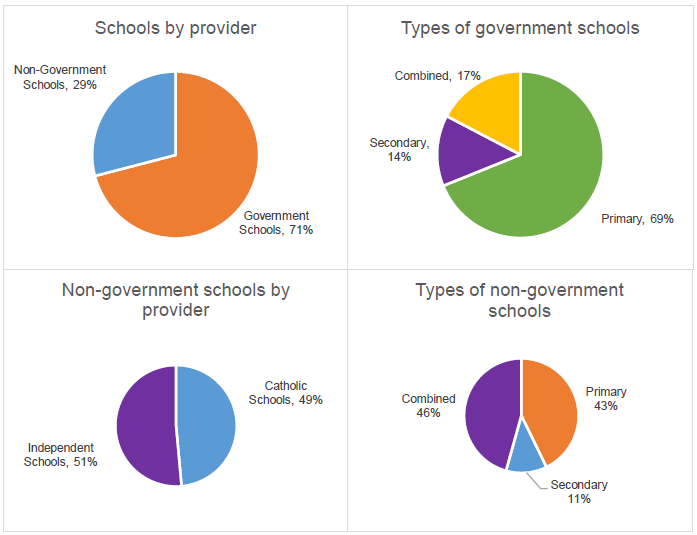
Number of schools by year on 30 June 2024
The number of registered schools has remained consistent year on year.
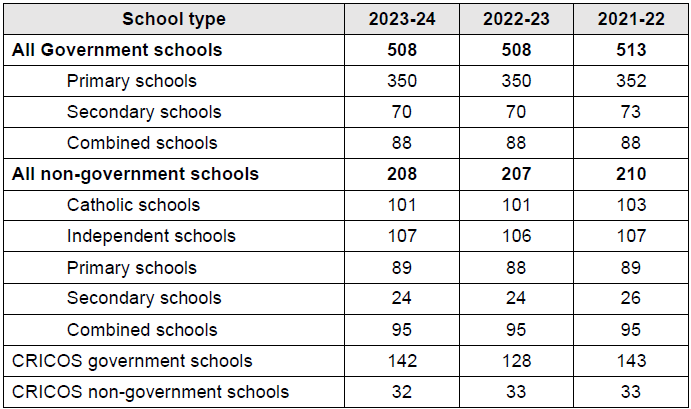
New school registration applications
No school closures occurred in 2023-24 compared with two in 2022-23.

Review of registration
In 2023, 594 school registration reviews were completed compared with 35 schools in 2022-23.
The significant increase is a result of previous legislative changes, where existing schools were re-registered, and therefore all became due for mandatory 5-year review at the same time. To minimise regulatory burden, 97% of reviews were conducted as school self-assessments, with the remaining 3% having a more in-depth assessment and/or site inspection.

Number of school site inspection visits
The number of registration review visits in 2023-24 was 17 compared to 37 in 2022-23. This was due to a change in regulatory strategy in which site visits were used in a more targeted way, based on risk factors.

Conditions on school registration

School complaints by school type
The agency received 27 complaints in 2023-24. The majority of school complaints (56%) remain active and most were for non-government schools (Catholic and Independent schools).

Student Exchange Organisations (SEOs)
Three SEOs renewed their registration in 2023-24.

Number of Acceptance Advice for Secondary Exchange Student (AASES) approved

National Quality Framework providers and services 2023-24
Approved providers by type on 30 June 2024
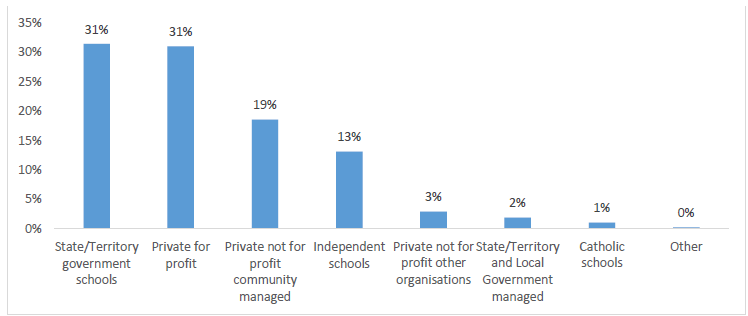
On 30 June 2024 there were 481 approved providers with approved services in SA. 84% (402) providers operate a single service.
In SA, 33% (160) of approved providers are government operated, compared to 7% (527) nationally.
Approved early childhood education and care services
There were 1,313 approved services in SA on 30 June 2024, an increase of 3% compared to the previous year. In 2023-24, there were 25 long day care, two family day care, two preschools and 10 out of school hours care newly approved services.
Residual services
There are 135 residual services regulated under the State Act. Of these, 78% (105) are provided by the Department for Education.

Approved services by type on 30 June 2024
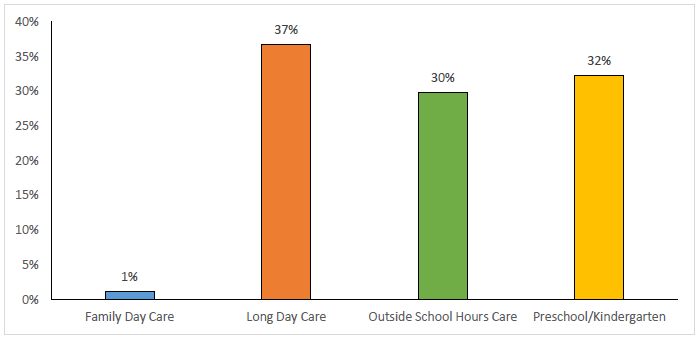
Service performance by rating on 30 June 2024

Of 1,313 services in SA, 95% (1,246) have a quality rating, compared to 91% nationally. Fifty-three percent (666) of services are rated under the current NQS and 47% (580) are currently rated under the previous NQS. Sixty-seven services are not yet rated because they have recently opened and will be assessed within 18 months of commencing operation.
Quality ratings of services by year on 30 June 2024
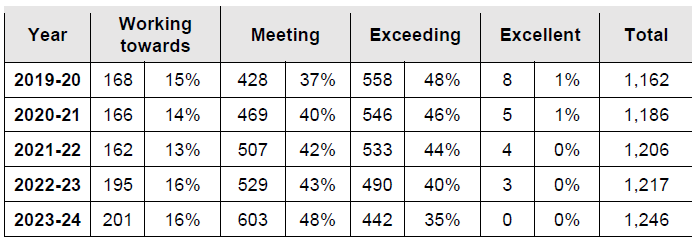
As of 30 June 2024, South Australia has 16% of services rated 'Working Towards', compared to 10% nationally. While the percentage remained the same in 2023-24 compared to 2022-23, there were a small number of additional services rated as 'Working Towards'.
Proportion of quality ratings by service type compared to national average on 30 June 2024
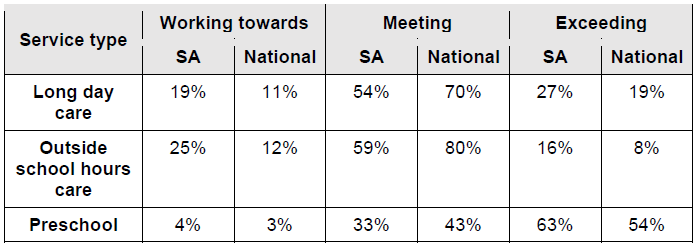
South Australia has a higher proportion of OSHC services rated as 'Working Towards' compared to nationally. The Department for Education and the agency are working closely together to improve the performance of this service type.
South Australia also has a higher proportion of services rated as 'Exceeding' in both long day care and preschool. This is due to SA having more services rated under the previous NQS compared to nationally.
Nationally, the number of services rated 'Exceeding' has steadily declined year on year because changes were made to the NQS in 2018 to require a more robust assessment against themes to achieve an 'Exceeding' rating. There has been a commensurate increase in the number of services rated as 'Meeting' as a result.
Assessment and rating of services in 2023-24

In 2023-24, the agency maintained a similar volume of assessment and ratings compared to the previous year.
Services rated as 'Working Towards' has significantly decreased from 56% (74) in 2022-23 to 23% (26) in 2023-24.
Twenty-nine percent (37) of services underwent the assessment and rating process for the first time with:
- 37% (14) rated as 'Working Towards'
- 61% (23) rated as 'Meeting'
- 3% (1) rated as 'Exceeding'.
Applications received under the National Quality Framework in 2023-24
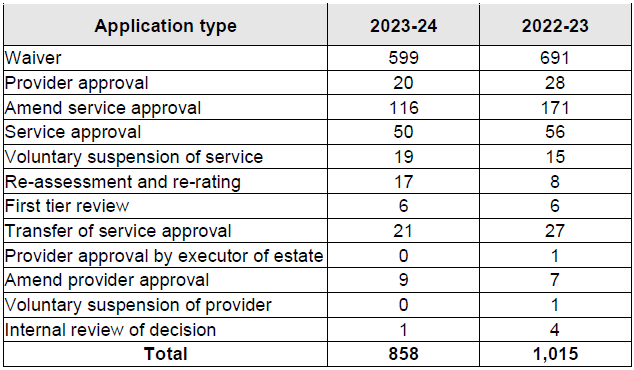
Total incident notifications received by outcome in 2023-24
In 2023-24, a total of 4,146 incident notifications were received, an increase of 20% compared to the previous year.

Serious incidents are a subset of incidents and include an injury or illness where a child seeks or sought medical attention, when children are missing or unaccounted for, locked in or out of the service or removed from the service without authorisation.
Serious incident notifications received by outcome in 2023-24
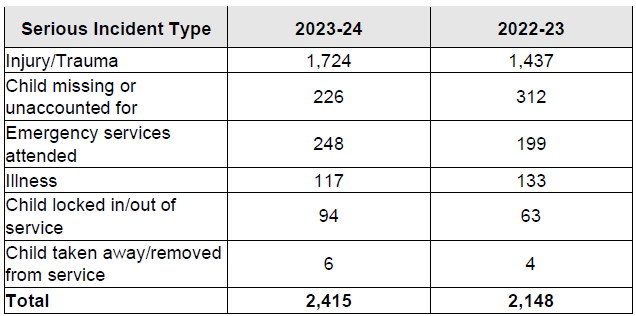
Complaints received about approved providers and services under the National Quality Framework in 2023-24
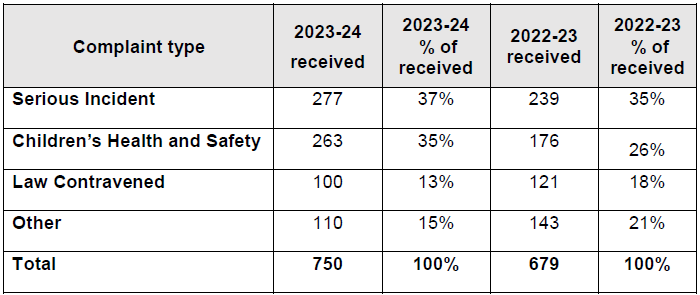
The agency received 750 complaints, an increase from 679 complaints received in 2022-23. A complaint can be raised both directly with the agency or at the service.
Top five breaches of the National Law and National Regulations 2023-24
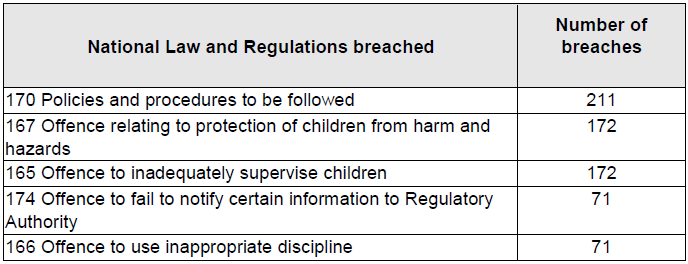
Statutory compliance actions issued by type and year

Appendix 2: Glossary
Services we regulate
Education and care services under the National Quality Framework (NQF)
Preschool: a service that provides an early childhood education program, delivered by a qualified early childhood teacher, often but not necessarily on a sessional basis in a dedicated service.
Long day care: a centre-based form of service which provides all-day or part-time care for children aged birth to six who attend on a regular basis.
Outside school hours care (OSHC): a service that provides care for primary school children (typically five to 12 years) before and after school and can also operate during school holidays (vacation care) and on pupil free days. OSHC services are usually provided from primary school premises.
Family day care: an education and care service that is delivered by two or more educators to provide education and care to children and operates from two or more residences (section 5(1) National Law).
Residual services under the Education and Early Childhood Services (Regulation and Standards) Act 2011 (SA)
In-home care services: a service providing education and care to children in premises where the majority of children usually reside and the educator does not reside.
Occasional care services: a service providing education and care to children primarily on an ad hoc or casual basis, where the service does not usually offer full-time or all-day education and care to children on an ongoing basis; and most of the children attending are pre-school age or younger.
Mobile care services: a service providing education and care primarily to children pre-school age or under, that transports equipment, materials and staff to one or more locations on each occasion the service is provided.
Schools under the Education and Care Services (Registration and Standards) Act 2011
School: a school is an education establishment where the major activity is the provision of full-time day primary or secondary education or the provision of distance education.
Primary education: comprises a foundation year (reception), followed by year levels one to six.
Secondary education: includes years seven to 12.
Combined school: provides both primary and secondary education.
Government schools: established and administered by the South Australian Government Department for Education under the Education Act 1972.
Non-government schools: any school that is not a government school. These schools may be administered by a religious, community or private organisation.
Catholic school: any school specified by notice in writing to the Registrar by the South Australian Commission for Catholic Schools Incorporated.
Independent school: non-government schools which are not Catholic schools.
Review: undertaken by the ESB through more in-depth assessment and/or site inspections.
Self-assessments: undertaken by a school to support renewal of their registration.
International education under the Education for Overseas Students Act 2000 and Education and Children's Services Act 2019 (SA)
Student exchange organisation: a registered school or not-for-profit organisation registered to provide secondary student exchange programs to and from South Australia.
Acceptance Advice for Secondary Exchange Student form (AASES): the form used by an international student to apply for a subclass 500 visa to enter Australia and to enrol in a South Australian school.
Commonwealth Register of Institutions and Courses for Overseas Students (CRICOS): a searchable database that provides details of educational institutions approved to deliver education and training services to overseas students, including the courses they offer.

